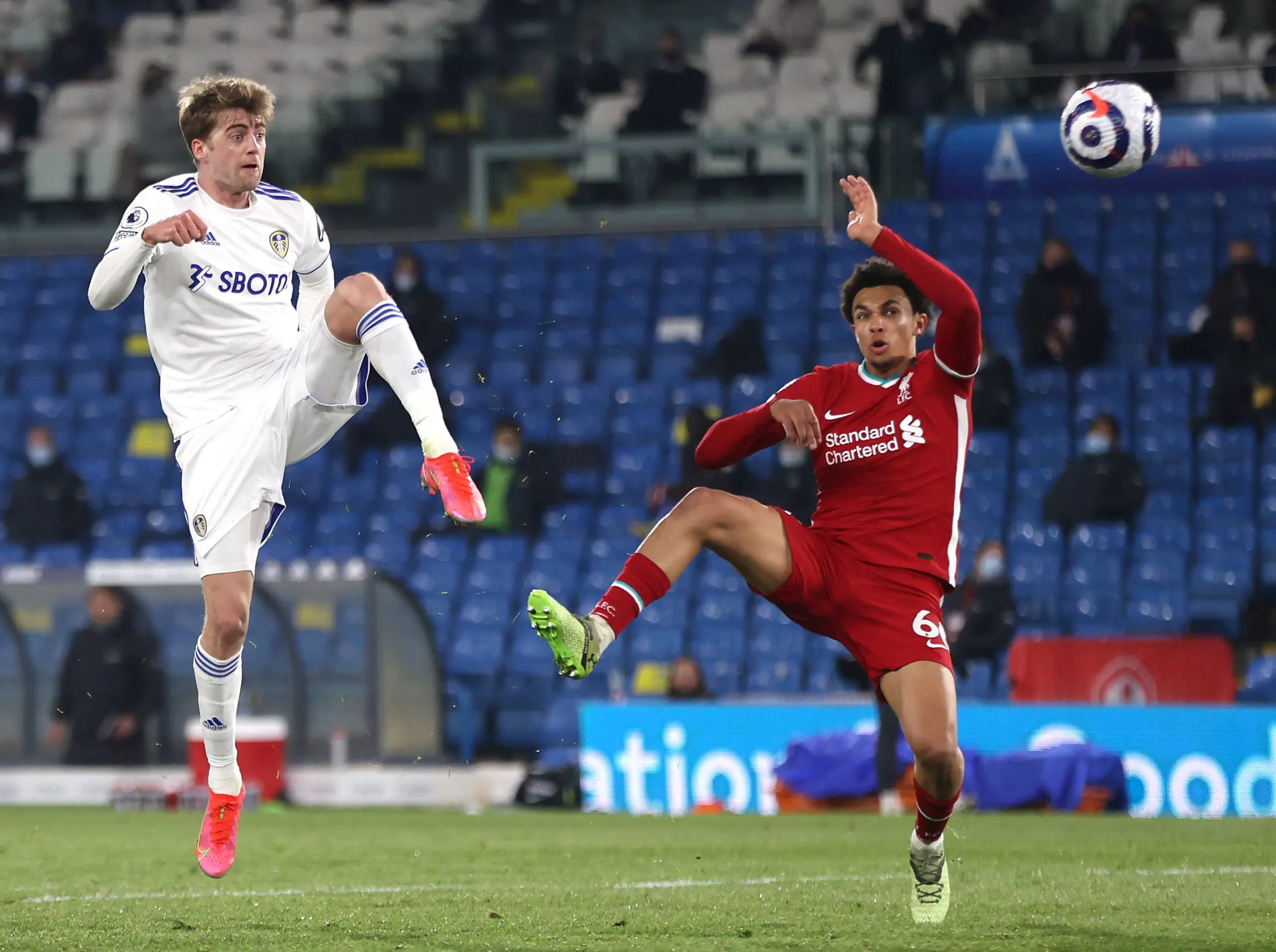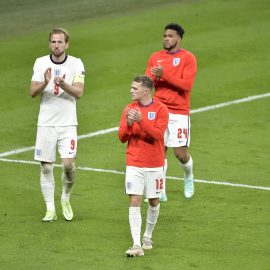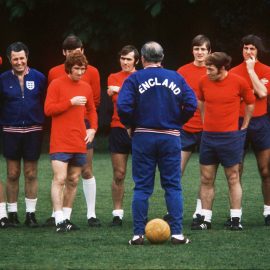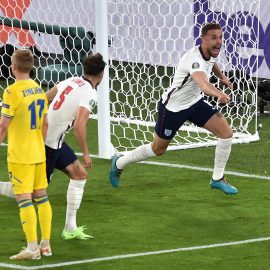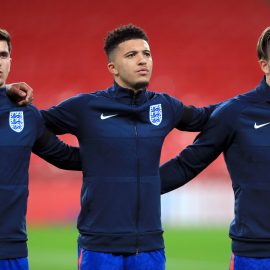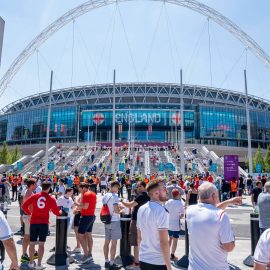Get all the updates on the latest England-Germany match here.
So it is that time again, Germany v England in Berlin on Wednesday night. And what better way to get a different perspective on a rivalry that has had as much written about it as perhaps any other in the world, than by getting a German- Stefanie Mueller- and an Englishman- me- to have a chinwag over the subject? Just don’t mention the war.
Is England / Germany really the biggest football rivalry for the English? Where does it rank in comparison with the England / Argentina rivalry? If Germany played Argentina in a World Cup final, who would you want to win? Who would you rather lose a similar game to?
NJ: Obviously it is hard to speak for the nation as a whole, but from my own personal experiences I would have to say that England tend to have a rivalry with any team who beats them! At the moment a lot of England fans would certainly like to see a victory over Portugal after the last two meetings between the sides at Euro 2004 & World Cup 2006, I think there was a lot of bitterness towards Portugal due to the perceived conduct of Cristiano Ronaldo, just as there was with Argentina & Diego Simeone in 1998.
The wartime analogies of course get brought up whenever England meet Argentina or, more so, Germany, and these are missing when England meet other nations, but from a football sense, the rivalry usually stems from previous meetings (usually defeats) and a sense of injustice from those meetings.
If Germany played Argentina or France in a World Cup final, I think you would find a nation divided. Increasingly these days with the amount of top class foreigners playing in England, you will find people rooting for other countries which feature their favourite club players. For example, a lot of Liverpool supporters this summer were behind Spain, due to the presence of Fernando Torres, Xabi Alonso, Pepe Reina & Alvaro Arbeloa. With a game such as Germany/Argentina, you would, I would imagine, find the Chelsea fans behind Ballack, the United fans behind Tevez, the Liverpool fans behind Mascherano & the rest would want to see a great game of football.
Having said that, I do believe that English fans love to see a technically gifted side prevail, and that would possibly tilt the scales towards Argentina, who have Messi, Agϋero, Riquelme et al. I think the typical English football fan would take the Argentine style over the German at this moment in time.
How much of the footballing background of this rivalry (Wembley 66, Mexico 70) is still alive today? Do the English actually still feel the need to wreak revenge because of all the times their national team got kicked out of tournaments? Or is it rather the feeling of having the crown as the best nation in football taken away from them by Germany during the 70ies that still fires on this rivalry?
NJ: Ah, the football. Of course this is a fixture that has, perhaps more than any other, been steeped in tradition of huge matches and memorable matches at World Cups and European Championships. I honestly can’t think of two nations who have shared so many momentous games over the years. For my generation, the memories of Italia 90 and Euro 96 are very painful. On both occasions the feeling was that if England had won then they would have been very well placed to win the tournaments, incredible to think that it could have been two major trophies in six years as opposed to at least 44 years without one.
For older fans the memories will be of Mexico 1970 and, of course, 1966. I think the wartime issues would certainly have been more prevalent at this time, which is only natural, being closer to the event of course. I think if you dig deep enough with a sensible, balanced football fan you will unearth a fair amount of respect for German players of the past and present.
What are the enduring images/memories of England/Germany clashes for Germans? Is there still a sense of injustice at the Geoff Hurst “goal” from the 66 final? Do German fans in general enjoy rivalries?
SM: The enduring memory for fans of my generation would be Germany going through on pens in yet another competition. Also, even though the game itself was boring, the image of Didi Hamann scoring the last goal at the old Wembley will be very fondly remembered by everyone — I think one group of fans even started a campaign to have a bridge leading to the new Wembley stadium named after him!
In terms of bad memories, the score 1-5 will be forever etched into most people’s memories, not only as an absolute embarrassment but also as a signal of the slow demise of German national football under Rudi Völler.
I can’t really speak for older fans, but my Dad keeps talking about Gerd Müller scoring the winning goal against England in important matches, so I’ll wager the guess that, for them, the enduring memory is “the bomber” barging through a packed defence and smashing the ball into the net.
The Geoff Hurst “goal” from the final has mainly been forgotten. After all, it’s more than 44 years ago and won’t change anything for today. If the papers dig it out, then it’s only for a historical report about the anglo-germanic rivalry, not in order to stir people up before the game. Even though there might have been a sense of injustice at the time, our national team’s success has long since ensured that we won’t mull bitterly about having lost a final so long ago but rather concentrate on the successful campaigns instead.
Speaking of rivalries, we don’t really do them, so feel honoured about all that attention bestowed upon you. The only other rivalry worth mentioning is the one with the Netherlands, and even this one has gotten quite subdued during the last years. We just need more than the football aspect to build up a decent rivalry, and in both rivalries we have, the historical background provides plenty of material. So, even though we lost plenty of important games against Italy or Argentina, I couldn’t describe the relationship to them as a rivalry; especially in the case of Italy it’s more likely a desire to wreak revenge and then go back to our usual indifference.
How much of the build-up is genuinely felt by the English and how much is just shitstirring by the broad sheets?
NJ: Good question. I think England’s media culture at the moment is as influential as it has ever been in football personally. The media, and especially the written press, has the power to speak for people more than at any time before. I recently wrote an article bemoaning the media-formed opinions of both fans, and supposed “experts” within the English game. It seems that every time England meet up there is a new head on the chopping block, whether it was Eriksson or McClaren in the past, now attention seems to have shifted from Beckham to Lampard to Gerrard. The tabloids certainly like to bring history into any England/Germany clash, and not necessarily football history of course. But for fans of my generation, the rivalry with Germany stems from memories of Italia 90 and Euro 96, as well as Wembley 2000 rather than anything more political or historical.
Of course you will get the uneducated idiots with the Nazi & Hitler talk, and even on the BBC you often find Germany’s side referred to as “The Germans” and predictable yarns about their “Teutonic efficiency” but that is down to laziness rather than anything more sinister. It is easy to stereotype football teams and players for pundits- e.g. Brazil are the skilful ones, Germany are the efficient ones, Argentina are the passionate ones, the Dutch play Total Football, the Italians dive and the English lose on penalties. The more intelligent members of the media are able to step away from the history, the stereotype and the hyperbole and offer some genuine insight into the game, and the opposition.
We all know the headlines in the English press before an England / Germany game, but how present are Nazi Germany and WWII actually in the supporters’ minds before or during a game? And how does the ’38 game (when English players performed the Hitlergruß before an international friendly) fit into this?
NJ: I may be somewhat naïve in this, but from my own point of view I would say that the whole War & Nazi angle is something that has no place in football, and I think that most educated English fans would agree. Yes the travelling England supporters will always contain an element of idiots who will sing songs about the war, or will refer to German players/managers/fans as Nazis, but I think these are very much a minority in today’s society.
As for the 1938 game, of course it is a memorable moment in the history of this fixture, but for today’s footballers and football fans, it is very much forgotten.
Media coverage in Germany: does it focus more so on the football aspect or is there also a lot of cultural/historical reference in the build up to England/Germany games (especially at Wembley)?
SM: It definitely focuses more on the football aspects. For example, you might find a detailed report about one of the English key players, a review of their last matches since Capello took over or a summary of the last times the two sides clashed.
However, here like just in every other country, we have papers hell bent on having controversial headlines and causing trouble, who grasp this golden opportunity with both hands and actually seem to enjoy mentioning World War II over and over again. I wouldn’t put it past them to dig anything up, just to spice things up.
Do you think that the 90ies effected any change in the perception of the German team (and the rivalry) by the English?
NJ: Do you know what I think helped change a lot of people’s perception of Germany? Jurgen Klinsmann. When he signed for Tottenham following the World Cup in 1994, he was one of the first real superstars to join the Premier League. Yes, we had great players in the past, but this was a World Cup winner, still in his prime, choosing to play in England. Of course Klinsmann had obtained, not unreasonably, a reputation in this country for being a diver, and there was an element of scepticism about this when he arrived. But in one fell swoop he was able to not only poke fun at the people who had pre-judged him, but to show that, contrary to what the stereotype suggested, Germans were not robotic beings, and were even capable of humour and irony.
Klinsmann was a massive success at Tottenham, and the significance of him being voted Football Writers’ Player of the Year in 1995 should not be understated. From a personal point of view, I can remember Klinsmann, along with Teddy Sheringham, producing a marvellous performance to knock my side Liverpool out of the FA Cup in the Quarter Finals at Anfield, and leaving the field to a great ovation from the home fans. It would have been hard to imagine following Italia 90, for example.
I also think the English successes against Germany at Euro 2000 and in that World Cup qualifier a year later helped a lot of England fans get their fix of revenge for past defeats. Although the Euro 2000 win was eventually rendered pointless after defeat to Romania in the next game, it was a competitive victory over Germany (albeit a particularly weak Germany side) and showed that despite what people were telling us, they weren’t unbeatable or always ultra-efficient, they were a football team, capable of good and bad.
The 5-1 game was a step further of course. Looking at the German line up from that game, it is not hard to see why England won, but the scoreline (not necessarily the manner, I think the scoreline was a little flattering) and the fact that it was in Munich, as well as the significance (often forgotten when this is brought up, England really didn’t fancy a play-off) made it a little bit more special for the fans.
Has the German perception of English football and/or supporters changed over the past few years? Would you say that the strength & power of the Premier League has earnt English football more respect from Germany as a nation?
SM: First of all, I think that most Germans distinguish very neatly between Premier League football and the national team. We enjoy watching the Premier League and many even have an English team which is close to their heart. The respect, though, is granted rather grudgingly, for we know, of course, that the English clubs’ supremacy is only due to the money available to them. Even a Championship club can afford to spend more than your average Bundesliga side, which of course invokes a feeling of injustice, especially when European competitions are concerned, but also when another good player chooses the Premier League over the Bundesliga.
However, we very well know that the success of the Premier League and its clubs cannot be transferred to the English national team. While the Premier League has, thanks to its quality, gone up in our estimation, the national team has rather gone down during the last five or so years. We’ve finally realized that, even though this is a team filled with players competing for the highest club honours in football, we don’t really have to fear anything of them. The quality of football under display, especially during the reign of Steve McClaren, has pushed the England team close to a team of clowns in our point of view. Particularly their self perception as a world class team has caused many a chuckle over here and, somehow, we have gone from respecting England as one of the huge forces in world football, to seeing them as a team we just make fun of.
Maybe this will change under Capello, but this remains to be seen….
Speaking of the fans, though, they are seen in a light as positive as never before. When growing up, my parents used to warn me about the “hooligan” England fans whose main enjoyment was not the football match but smashing everyone’s heads in. But when we met the travelling England supporters during the World Cup 2006, we kind of realized that they were normal, that they were just like us. And that they were a set of brilliant supporters, singing and dancing in the streets and definitely not smashing anyone’s heads in.
The Premier League is maybe the best league in the world right now. Are there any positives to draw from that for national team football? Or is the influx of foreign players more a of a problem than of a stimulation?
NJ: Ah the million dollar question. Foreigners in England, good or bad?
Over simplified maybe, but I do believe that if an English player is genuinely good enough, with a strong enough mentality, then he will flourish in the Premier League. The questions of technique, coaching and discipline often come up with regards to English players, and maybe we don’t produce players as technically gifted as nations like Brazil, Argentina, even Spain. But is that down to coaching, or upbringing, or the individuals?
It is hard to pinpoint exactly. English coaching is slated for having a “win at all costs” type of mentality, but if England were successful, this would be held up as a reason why England has such great spirit. It is only when things go wrong that we look for answers. Maybe the answers are a bit simpler, the players didn’t play well enough, the manager didn’t pick the right team/squad, the opposition were better, rather than anything more deep rooted.
On another note with regards to young players. On Tuesday night Arsenal beat Wigan in the Carling Cup with a side, oldest player was Lukasz Fabianski (23 years of age). This side contained five English players, plus one on the bench- Gavin Hoyte, Kieran Gibbs, Mark Randall, Jack Wilshere, Jay Simpson & Henri Lansbury- and was praised in all quarters (rightly so) for the incredible way they played. The passing, movement, awareness and technique shown were fantastic. It proves that there are young English players blossoming, and that they are capable of playing football on a level with the foreigners they supposedly can’t match. It’s all about mentality, coaching and the opposition.
The German squad has one or two new faces in it, who are the new players we should be looking out for? I notice a couple of Hoffenheim players have been called up after their fantastic start to the Bundesliga season, is Joachim Loew starting to move away from the traditional names (e.g. Torsten Frings has been left out) and looking to bring through a younger, perhaps more effervescent type of player? Or is this simple experimentation in a friendly?
SM: One everyone should be looking out for is Marko Marin. I’m quite surprised that he isn’t being chased by a couple of big Premier League clubs already. Marin is an attacking midfielder who can play in the hole or on either side, and his skills with the ball are the best I’ve seen from a German player in a long, long time.
The Hoffenheim players are the surprise package of the season — these two aren’t really that young anymore and I’ll be excited to see how they’re doing outside that very special environment in Hoffenheim. Tobias Weis, in particular, has been playing really well and has been called “a good alternative for the established midfield players” by Löw.
Also, another fantastic young player is Piotr Trochowski, who seems to have been around for Hamburg for ages but who’s only having his breakthrough in the national side right now. He has a good shot on him, is skilful and links up very well with Lahm on the left (though Lahm, being injured, won’t play).
Speaking of older players being left out, I was surprised about the lack of media coverage the so-called “Ballack drama” got in the UK. Both Frings (who was only on the bench for the last few games) and Ballack gave interviews detailing that they wanted “recognition for their services in the past” and that they only agreed with Löw’s policy of bringing in younger players as long as it didn’t concern their starting places. Löw, of course, was furious, and even though both Ballack and Frings have apologized to him, Frings consequently isn’t in the squad for the friendly.
Generally speaking though, Löw enjoys experimenting. The whole Klinsmann / Löw era has been marked by younger players shining (surprisingly, sometimes) in the national team. Therefore, it is only consequent for him to use this friendly to try out several more players who have caught his eye in recent times. This doesn’t necessarily mean the end of Frings’ national team career: it’s the performance which counts for Löw, and once Frings starts doing better in his club side he’ll also be called up again.
When I look at the squads on paper, then the English team should have no problems with the German side — with all the world class players they are able to field, it seems a bit like David versus Goliath, in fact. How can, in your opinion, Germany still cause trouble for the English team? Who is (are) the player(s) the Germans will need to stop?
NJ: Well England, as ever, have seen a lot of withdrawals from the squad from the big clubs. The likes of Chelsea, Liverpool & Manchester Utd see international friendlies as a nuisance to their own plans.
So far we have seen Joe & Ashley Cole, Lampard, Rooney, Gerrard, Ferdinand, Joe Hart, Wes Brown & Emile Heskey all ruled out, whilst John Terry is a doubt also. David Beckham & Michael Owen have both been left out due to worries about their match fitness I would guess. Owen scored at the weekend for Newcastle but has only played around an hour of football since September.
This will give chances to a number of new faces hopefully, the most surprising call up was Michael Mancienne, a young centre half who is contracted to Chelsea but is currently on loan to Wolves in the Championship. He is only 20 years old, and is yet to make a Premier League appearance, but he has been doing well for the Under 21 side under Stuart Pearce and has impressed on loan at Queens Park Rangers in the past. I think it is a good call by Capello, a young centre half very much in the Ferdinand mould, good athlete, pacy, strong and a decent ball player. It will be good to have a look at how he handles a step up, I know John Terry thinks a lot of him and so did Jose Mourinho when he was Chelsea boss, so Capello is in good company.
The other main news really concerns the Aston Villa duo Gabriel Agbonlahor & Ashley Young. They have been overlooked in the past by Capello, with Agbonlahor left in the Under 21 side and Young left out completely, and there has been a lot of support behind the pair featuring for the full side. It is hard to argue with their form, for Villa these two have been arguably two of the most consistent English performers in the Premier League for a good twelve months now and it is about time we saw them for England.
Young is a wide midfielder, who can also play as a centre forward. He has occasionally been used as a central attacking midfielder by Villa but he is for me best used wide on the left- despite being right footed. He runs at defenders, his delivery off either foot is very good (Villa have John Carew who benefits immensely from his crosses), and he scores goals both from open play and, especially, from set pieces. His free kicks are a major weapon for Villa. He also showed at the weekend he has a strong character, he missed a penalty early on for Villa but kept his composure and gave Arsenal a torrid time, creating the opening goal with a cross that forced Gael Clichy to head into his own net, and generally tormenting his full back every time he got the ball. I think Young is capable of nailing down a starting place for England if he carries his club form over, thankfully he has been given a chance.
Agbonlahor is a centre forward, quicker than Young (and most players, he is lightening), but more raw. When he first burst onto the scene at Villa I was sceptical, he played a lot with his head down and his finishing was less than impressive. But under O’Neill, and with Villa playing good football, Agbonlahor has really come on leaps and bounds. He scores goals aplenty, he got the second for Villa at Arsenal on Saturday with a great piece of forward play, holding off William Gallas and smashing a half volley past Manuel Almunia. He seems to be pretty two footed, full of confidence, and his pace is enough to turn even the quickest defender. Obviously he is nowhere near the finished article but he has all the attributes to be a real asset to England, I do wonder how much he benefits from having a big guy like Carew to play alongside, I wonder if he and Rooney for example would be as effective, but we will see how he handles the call up.
Few other noteworthy call ups. Darren Bent has come back into the squad after an absence of a year. He has been in decent form for Spurs, with 11 goals in 16 games this season. I have serious reservations about his overall quality, I must admit. He has struggled at Spurs since they paid £16.5m for him from Charlton a year ago, I don’t think his game is particularly suited to a club such as Spurs, who try to play good passing football. Bent is a goalscorer, he doesn’t for me do an awful lot else with regards to build up play or creating chances. His finishing is good when he is confident, as he is at the moment. When he is not confident he can look cumbersome and really really poor. I don’t see Bent as a long term player for England, I think even Capello can see that the likes of Owen & Defoe give everything Bent can give and more besides, but he is a man in form and so he has been given the nod this time. A hat trick in Berlin might change things.
Curtis Davies is another Villa player, and for me a strange call-up. He built his reputation at West Brom in 2005-06 when he impressed in a side that was eventually relegated. He is a tall, athletic defender who is good in the air and will rarely be found wanting for pace. But he has a massive weakness for me in that his football ability is poor, he gets caught on the ball a lot, his distribution is poor and he can look very clumsy in and around the box, giving away free kicks and such. It is also arguable that he is a first choice player at Villa, they have both Martin Laursen & Carlos Cuellar as centre halves, with Luke Young at right back, so it is doubtful whether Davies would be first choice if Martin O’Neill had all his players available. I personally believe that Everton’s Phil Jagielka would have been a more deserving call-up, he has been in superb form this season. But Capello seems to rate Davies, and we may well see him pick up his first cap with Terry, Ferdinand & Brown all missing.
Obviously in recent years both Oliver Kahn & Jens Lehmann have retired from the national team, meaning the first choice goalkeeper position is up for grabs. Who is the current favourite (if there is one) to occupy that position?
SM: The current favourite is René Adler who plays for Bayer Leverkusen. His only serious contender used to be Robert Enke (Hannover 96) but he went and broke his hand, so Adler took his chance to make the spot his own and I dare say that with his performance against Russia, he really has.
However, we have some younger keepers who might challenge in a couple of years (though I don’t expect them to actually play a part until after the World Cup 2010), notably Manuel Neuer (Schalke 04, another one of the good penalty keepers — he played a vital part in Schalke reaching the quarter finals of the Champions League last season) — and Michael Rensing (Bayern Munich and long-term understudy to Oliver Kahn).
None of them is quite as mad as Kahn and Lehmann though…
Good English goalkeepers seem to be pretty hard to come by. Who’s the current favourite for the spot? What do you make of the rumours of Almunia wanting to play for England?
NJ: Damn right they are! I am a massive goalkeeper critic, I think there are only a handful of truly class goalkeepers in the world, the rest are mistakes waiting to happen!
At the moment I have major worries about England’s goalkeeping position. You look at Spain & Italy and they have it locked down with Casillas & Buffon. England for me doesn’t have anyone a) at that level or b) with the potential to reach that level. There are plenty of English keepers in the Premier League at the moment; the trouble is that all of them have massive failings. David James is the current No. 1 for England, and he is still for me our best keeper, but he is someone who makes mistakes, and often in important moments in important games. He is also 38 years of age, and will be nearly 40 by the time the World Cup arrives, so is hardly one for the future, and we saw with both Peter Shilton & David Seaman the dangers of having a goalkeeper who is past his best at a World Cup.
Behind James, Paul Robinson has gone so far off the boil it is hard to remember when he was actually a decent keeper. He is one keeper who seems to let a staggering amount of “saveable” shots go past him, especially from long range. I don’t know whether it is his agility, or his technique or just the fact that he isn’t very good, but he seems to have a basic deficiency in diving for shots. Not ideal for an international keeper.
Then there are the hopefuls. The third keeper in the squad at the moment is Scott Carson of West Brom. He was supposed to be a real star when he left Leeds for Liverpool, but he never got many chances at Anfield and had loan spells at Charlton & Villa before moving to West Brom this summer. He is a shot stopper, but there are reservations about how he comes off his line, his general presence and his consistency- another one who makes mistakes more often than he should. I don’t think he is the answer, as we saw when he made a couple of errors for England against Croatia in the rain at Wembley.
Others in the frame, Joe Hart of Manchester City (pulled out with a foot injury to be replaced by Robinson), Chris Kirkland of Wigan (perhaps the most talented of all, but very very injury prone), Ben Foster of Manchester Utd (highly rated, but doesn’t get enough games and has also had a serious knee injury), Ross Turnbull at Middlesbrough (in good form but has not been tried at even Under 21 level). These are all options, but none stand out for me as being potential world class.
As for Almunia, the issue of him qualifying for England is not a problem with me. The problem I have is that even if he does, I don’t rate him particularly either. I think he is one area that Arsenal can improve. I was of the belief last season that Jens Lehmann should have been first choice (although I could see Wenger’s thinking and Almunia has grown into a very vocal goalkeeper). I don’t think he would ever be considered for England if he did switch allegiance, but for talent reasons as much as anything. There is a better goalkeeper in Carlo Cudicini who would be qualified for England, but who doesn’t get any sort of mention. Almunia would not stand a chance.
Mario Gomez suffered a pretty torrid Euro 2008, despite his great success at VfB Stuttgart, how has he reacted to this?
SM: I think we need to differentiate between his reaction on club and on national level.
I don’t watch too many VfB Stuttgart games, but from what I’ve seen and also read in the match reports, he has continued doing just as well as before. He’s still the VfB’s top scorer and, even more to his credit, the goals have been coming in vital games as well. Without him, the VfB would be out of the UEFA cup and maybe even on a relegation spot in the Bundesliga; I remember him scoring a last-minute equalizer in a very scrappy match against Eintracht Frankfurt last Sunday.
However, his national team confidence has received a massive blow. He has yet to score for the national side since the World Cup qualifying campaign started and just doesn’t seem like the player he used to be. There’s a general nervousness about him as soon as he steps on the pitch, which certainly isn’t helped by the fans loudly guessing how he’ll fail to score this game.
In a way, he’s the complete opposite of Podolski, who still hasn’t established himself for Bayern Munich but still performs for the national team when it matters most.
With Capello, England have a very capable manager who might lead them to glory again. What do you make of his tenure so far? Can you already make out attempts of a reformation? Do you think that he might be able to make a similar impact like Klinsmann in Germany from 2004 onwards?
NJ: Cards on the table time, I’m a Capello fan. I was delighted we got him as manager. The old tales about lack of leadership and passion under Eriksson, or lack of nous under McClaren will not crop up under Fabio Capello. You can see how he wants England to play, patiently, with discipline, short passing and fluidity of movement, and in my opinion the signs are promising. I say this a lot, but England’s biggest problem for me is the media. The pressure is intense for all nations, but for England it not only seems to be worse, but for the wrong reasons also. Journalists go to England games with an agenda, to pick out someone, or something, that isn’t right with England, and then make up both a reason why, and a solution. They don’t accept bad performances, they don’t accept off days.
At the moment, it’s Steven Gerrard. People saying he shouldn’t be in the side because he gives the ball away and he doesn’t stay rooted in centre midfield, Lampard is better. Before that it was Lampard, he shoots too much and Gerrard is better. Prior to that it has been Beckham, one trick pony who holds the side back. There is always a scapegoat with England, I think what Capello has tried to do is to create the environment of collective responsibility. Win as a team, fail as a team. He did it at Roma, at Milan, at Juventus, at Real Madrid, with great success. Not to say he doesn’t encourage good players to play, Gerrard & Rooney, Joe Cole, Walcott, they have all been great to watch at times since Capello turned up. He just believes that the team rules supreme over the individual. Rightly so.
I wouldn’t compare him to Klinsmann as such, I think Klinsmann was more dynamic in terms of new, radical ideas, and was preaching them to perhaps more receptive, adaptable players. It is also easy to forget that he essentially had 2 years of non-pressure football, Germany never had to qualify for World Cup 2006, and the expectations after Euro 2004 must have been uber-low. He had 2 years to mould a side away from the pressures of picking up points in Macedonia or Belarus, and he had the advantage of being a German legend to boot. Capello is very much an outsider, respected though he may be. He is trying to teach a whole new way of playing to young English players and, in my opinion, is starting well.
Add Sportslens to your Google News Feed!
